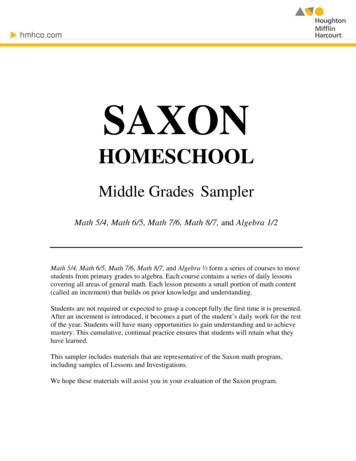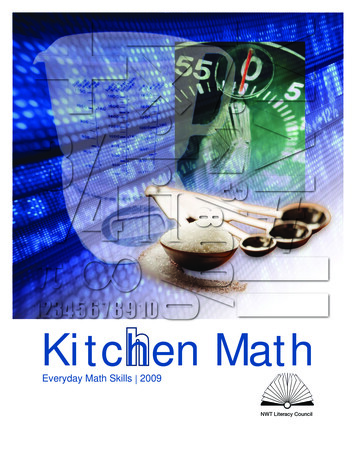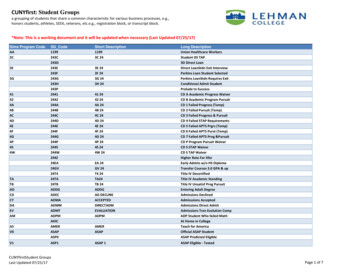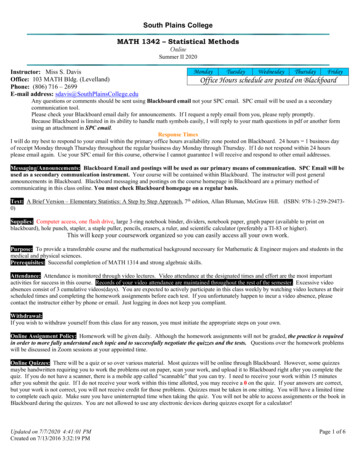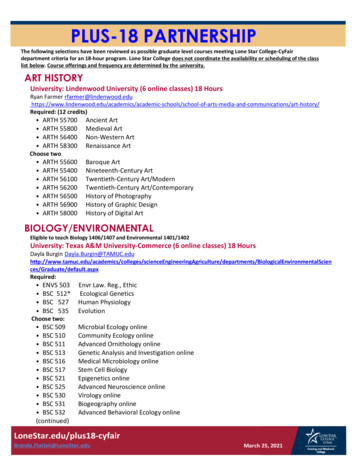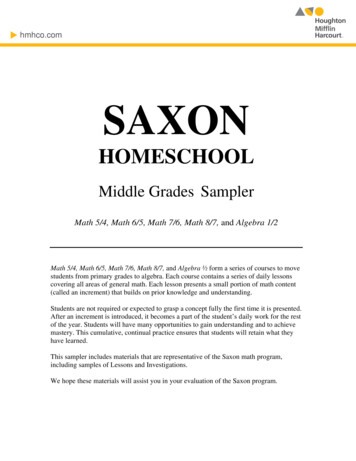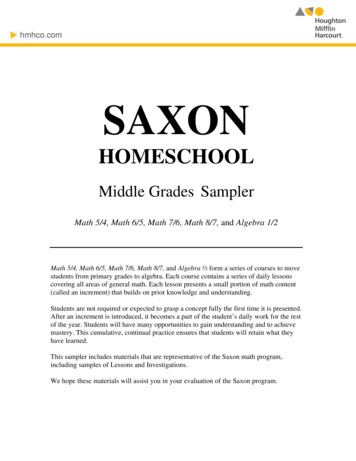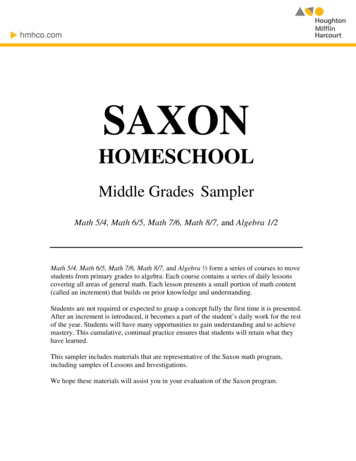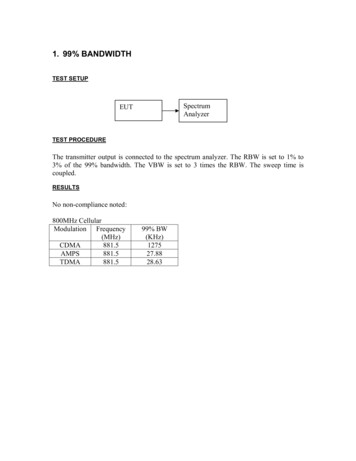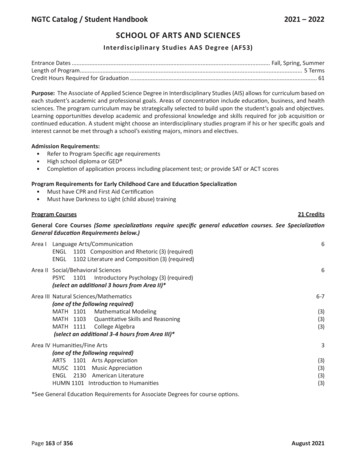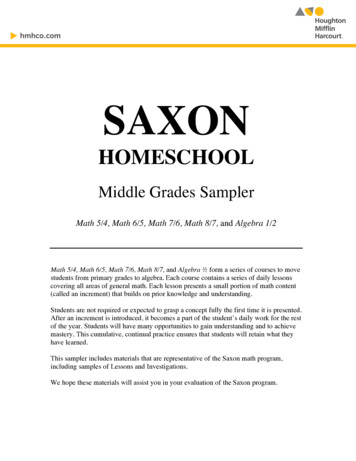
Transcription
Introductory Statistics – MATH 1342.881, OnlineSyllabus: Summer 1, 2022“Northeast Texas Community College exists to provide personal, dynamic learning experiences empoweringstudents to succeed.”Professor: Dr. Leah ReaganOffice: Math/Science Bldg.Phone: 903.434.8290 (not in office in summer)Email: lreagan@ntcc.edu (Email or TEAMS texts is the fastest way to reach eOnlineOnlineOnlineFridayOnlineProfessorchecks emailand Remindtexts multipletimes daily.This syllabus serves as the documentation for all course policies and requirements,assignments, and instructor/student responsibilities.Information relative to the delivery of the content contained in this syllabus is subject to change.Should that happen, the student will be notified.Course Description:This is an elementary course in statistics, designed to meet the needs of nursing, business, educationand behavioral science students. Included are the following topics and their applications in variousfields: frequency distributions, probability, random sampling, central tendency, dispersion, normaldistribution, binomial distribution, sampling distributions, confidence intervals, hypothesis testing,Chi square, analysis of variance (ANOVA), and linear regressions analysis.Prerequisite(s): Appropriate test score / TSI placement with multiple measuresStudent Learning Outcomes:Upon successful completion of this course, students will1342.1 Demonstrate an understanding of descriptive statistics.1342.2 Exhibit an understanding of the basic principles of sampling.1342.3 Determine values using various probability distributions.1342.4 Develop an ability to generalize from sample to population.1342.5 Utilize various hypothesis tests including linear regression and correlation.
Core Curriculum Purpose and Objectives:Through the core curriculum, students will gain a foundation of knowledge of human cultures and thephysical and natural world; develop principles of personal and social responsibility for living in a diverseworld; and advance intellectual and practical skills that are essential for all learning.Courses in the foundation area of mathematics focus on quantitative literacy in logic, patterns, andrelationships. In addition, these courses involve the understanding of key mathematical concepts and theapplication of appropriate quantitative tools to everyday experience.College Student Learning Outcomes:Critical Thinking SkillsCT.1 Students will demonstrate the ability to 1) analyze complex issues, 2) synthesize information,and 3) evaluate the logic, validity, and relevance of data.Communication SkillsCS.1 Students will effectively develop, interpret and express ideas through written communication.Empirical and Quantitative SkillsEQS.1 Students will manipulate numerical data or observable facts by organizing and convertingrelevant information into mathematical or empirical formEQS.2 Students will analyze numerical data or observable facts by processing information with correctcalculations, explicit notations, and appropriate technology.EQS.3 Students will draw informed conclusions from numerical data or observable facts that areaccurate, complete, and relevant to the investigation.Evaluation/Grading Policy:Two major 100 point examinations will be given, and together they will count for 40% of your totalgrade. If an exam is missed or failed, the highest possible make-up grade is a 70 (with instructornotification prior to the exam missed). All exams will be online.The average of a series of homework assignments will be worth 30% of the total grade (all homeworkis on MyStatLab). All homework due dates are posted on MyStatLab. Homework is due on the duedate no exceptions.A comprehensive final examination will contribute 30% to the final grade. The final exam must beproctored. We will discuss proctor options closer to final exam time. We might use Zoom or ProctorNow, or I may find something better between now and then. It will still be taken at home though.
Tests/Exams:Two Major ExamsOnline Homework Assignments*Final ExamTOTAL40% (20% each)30%30 %-------------100 %"A" - 90%"B" - 80%"C" - 70%"D" - 60%"F" - Below 60% All due dates can be found on the calendar at the top of your MyStatLab Homepage, and at thebottom of this syllabus (be sure to print out this syllabus and keep the due dates).Online assignments are graded exercises posted on MyStatLab for each chapter assigned.The last grade earned for each homework assignment will be posted for the final grade.There are no make-up assignments.Any online assignment or exam not submitted will receive a grade of zero (at the end of thesemester).Required Instructional Materials:Triola, Elementary Statistics, 13th EditionPrinted textbook with MyStatLab access code.Publisher: Pearson Publishing Co. (www.pearson.com)ISBN Number-978-0-13-474853-5 (Inclusive Access Content – MyStatLab access code)ISBN Number-978-0-13-446306-3 (Loose-leaf print upgrade)Note: The NTCC Bookstore link is at www.ntcc.eduOptional Instructional Materials: NoneMinimum Technology Requirements:Graphing Calculator is required. TI-84 is preferred, but other models may be approved by the instructor.Required Computer Literacy Skills:1) Communicate via email;2) Saving and reloading saved files;3) Navigate Blackboard to access posted materials and MyStatLab assignments.Course Structure and Overview:This is a 5-week online course where students are required to access graded activities on MyStatLab viathe Blackboard Learning Management System. Students are required to complete online homework inaddition to two regular exams and a final exam. It is very important students keep up with coursematerials and assignments since this is a very fast-paced, college-level course. Students are expected to
watch posted instructional videos, read the course textbook, and complete online assignments located inMyStatLab by due dates.Students need to check their email and TEAMS (texts) accounts daily AND log in to MyMathLab to makesure they receive all communications from the professor.Course Outline:I.Introduction to StatisticsA. Statistical and Critical ThinkingB. Types of DataC. Collecting Sample DataII.Summarizing and Graphing DataA. Frequency DistributionsB. HistogramsC. Graph QualitiesIII.Statistics for Describing, Exploring, and Comparing DataA. Measures of CenterB. Measures of VariationC. Measures of Relative Standing and BoxplotsEXAM #1 (over Chapters 1, 2, & 3)IV.ProbabilityA. BasicsB. Addition RuleC. Multiplication RulesD. CountingV.Discrete Probability DistributionsA. Probability DistributionsB. Binomial Probability DistributionsVI.Normal Probability DistributionsA. Standard Normal Distribution and ApplicationsB. Sampling Distributions and EstimatorsC. The Central Limit TheoremD. Assessing NormalityE. Normal as Approximation to BinomialEXAM #2 (over chapters 4, 5, & 6)VII.Estimates and Sample SizesA. Estimating a Population ProportionB. Estimating a Population MeanC. Estimating a Population Standard Deviation or VarianceVIII.Hypothesis TestingA. Basics of Hypothesis TestingB. Testing a Claim about a MeanIX.Inferences from Two SamplesA. Two Means: Independent SamplesB. Two Means: Dependent SamplesX.Correlation and Regression
A. CorrelationB. RegressionXI.Chi-SquareA. Test of IndependenceB. Test of HomogeneityFINAL EXAM (over chapters 7, 8, & 10)Communications:Emails and TEAMS texts will be responded to within 24 hours.The college’s official means of communication is via your campus email address. Your instructor willuse your campus email, Blackboard, and TEAMS texting to communicate with you outside of class. Youneed to check these daily so that you won’t miss any information from your instructor. Make sure youkeep your campus email cleaned out and below the limit so you can receive important messages.Institutional/Course Policy:Since this is an online course, students need to be self-motivated to keep up with the work. Studentsshould be working on homework daily in order to keep up. Students need to watch the videos provided inBlackboard and on MyStatLab to help them learn the material.No late work will be accepted. It is the student’s responsibility to check Blackboard and NTCC email forimportant information/announcements regarding the course. Students should be working on coursematerial via Blackboard daily. Do not wait until the last minute to complete and submit assignments incase of technology issues.NTCC Academic Honesty/Ethics Statement:NTCC upholds the highest standards of academic integrity. The college expects all students toengage in their academic pursuits in an honest manner that is beyond reproach using their intellectand resources designated as allowable by the course instructor. Students are responsible foraddressing questions about allowable resources with the course instructor. Academic dishonestysuch as cheating, plagiarism, and collusion is unacceptable and may result in disciplinary action.This course will follow the NTCC Academic Honesty and Academic Ethics policies stated in theStudent Handbook. Refer to the student handbook for more information.ADA Statement:It is the policy of NTCC to provide reasonable accommodations for qualified individuals who arestudents with disabilities. This College will adhere to all applicable federal, state, and local laws,regulations, and guidelines with respect to providing reasonable accommodations as required to affordequal educational opportunity. It is the student’s responsibility to request accommodations. Anappointment can be made with the Academic Advisor/Coordinator of Special Populations located inStudent Services and can be reached at 903-434-8264. For more information and to obtain a copy of theRequest for Accommodations, please refer to special population page on the NTCC website.Family Educational Rights and Privacy Act (FERPA):The Family Educational Rights and Privacy Act (FERPA) is a federal law that protects the privacy ofstudent education records. The law applies to all schools that receive funds under an applicable programof the U.S. Department of Education. FERPA gives parents certain rights with respect to their children’s
educational records. These rights transfer to the student when he or she attends a school beyond the highschool level. Students to whom the rights have transferred are considered “eligible students.” In essence,a parent has no legal right to obtain information concerning the child’s college records without thewritten consent of the student. In compliance with FERPA, information classified as “directoryinformation” may be released to the general public without the written consent of the student unless thestudent makes a request in writing. Directory information is defined as: the student’s name, permanentaddress and/or local address, telephone listing, dates of attendance, most recent previous educationinstitution attended, other information including major, field of study, degrees, awards received, andparticipation in officially recognized activities/sports.Tentative Course Timeline (*note* instructor reserves the right to make adjustments to thistimeline at any point in the term):Course Schedule:10ASSIGNMENTS:ORIENTATION HomeworkDUE DATES:06/0921Chapter 1 Homework06/1132Chapter 2 Homework06/1443Chapter 3 Homework06/1651-3REVIEW FOR EXAM #106/1861-3EXAM #1 (Chapters 1,2, & 3) –June 18 - 19Opens at 8 am on 06/18 and closesat midnight on 06/1974Chapter 4 Homework06/2285Chapter 5 Homework06/2496Chapter 6 Homework (6.1-6.5)06/26104-6REVIEW for Exam #2 (Chapters 4, 5, 6)06/28114-6EXAM #2 (Chapters 4, 5, & 6) –June 28 - 29Opens at 8 am on 06/28 and closes atmidnight on 06/29127Chapter 7 Homework (7.1, 7.2, 7.3)07/02
138Chapter 8 Homework07/041410Chapter 10 Homework07/06157-8,10FINAL EXAM REVIEW (Chapters 7, 8, 10)07/08167-8,10FINAL EXAM!!! July 7 - 8Final opens at 8 am on 07/07 and closes atmidnight on 07/08
Introductory Statistics - MATH 1342.881, Online Syllabus: Summer 1, 2022 "Northeast Texas Community College exists to provide personal, dynamic learning experiences empowering students to succeed." Professor: Dr. Leah Reagan Office: Math/Science Bldg. Phone: 903.434.8290 (not in office in summer)
